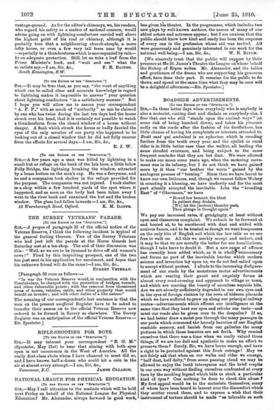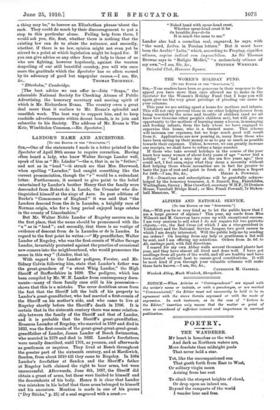ROADSIDE ADVERTISEMENTS.
[TO THE EDITOR OP THE " SPECTATOR")
Sin,—In these latter days when everybody who is anybody is also a motorist, casting dust and disdain on everybody else, I fear that one who still "stands upon the ancient ways " (at some risk of being knocked down), and takes his pleasure sadly on the roads after the fashion of his forefathers, has
little chance of having his complaints or interests attended to. Beati aunt gui ambulant is an aphorism which is receding
further from the truth every year, and the cyclist or rural rider is in little better case than the walker, all leading the same clouded existence, and being subject to the same frequent reminder that they are but dust. We were allowed to make our moan some years ago, when the motoring move- ment was in its infancy, but I do not think we have gained more by it than " our brother the worm" gained by the analogous process of "turning." Since then we have learnt to know our own littleuess, and, though we cannot follow Wolsey in counting it a blessing, we have modestly and for the most part silently accepted the inevitable. Like the " brooding East" of " Obermann," we have " Bowed low beneath the blast In patient deep disdain.
[We] let the [motors] thunder past, Then plunge in thought again."
We pay our increased rates, if grudgingly, at least without open and clamorous complaint. We submit to be frowned at and hooted at, to be smothered with dust and stifled with noxious fumes, and to be treated as though we were trespassers on the only bits of English soil which the law tells us we are free to walk on. All this we meekly accept and endure, and it may be that we are morally the better for our humiliations, though I take leave to doubt it. But a new cause of offence has recently been added which, as it is whollYnnnecessary and forms no part of the inevitable burden which modern science and invention lay upon us, we do not feel called upon to accept without protest. I allude to the increasing disfigure- ment of our roads by the monstrous motor advertisements which are rearing their gaunt and ungainly forms at almost every road-crossing and approach to village or town, and which are marring the beauty of countless wayside bits. Are we not already sufficiently degraded in our own eyes and in the eyes of foreign visitors by the rows of hideous placards which we have suffered to grow up along our princir al railway routes—advertisements which affront our intelligence at the same time that they hurt our eyes and rebuke our taste—and must our roads also be given over to the despoiler P If so, we had better draw a moist pen through the many passages in our poets which commend the homely beauties of our English roadside scenery, and banish from our galleries the many pictures in which those beauties are set forth. Why remind ourselves that there was a time when we really valued these things, if we are too dull and apathetic to make an effort to preserve them ? Surely, Sir, we have borne enough, and have
a right to be protected against this fresh outrage I May we not fairly ask that when on our walks and rides we emerge, "half dust, half deity," from some passing cloud we may be allowed to enjoy the lucid interspaces and the brief respite in our own way without finding ourselves confronted at every turn by the mocking legend which bids us stock a particular
kind of tyre P Can nothing be done to check this abuse P My first appeal would be to the motorists themselves, many of whom have been heard to lament over the discomfort which they scatter round them, and to express a wish that their
instrument of torture should be made " as tolerable as such a thing may be," to borrow an Elizabethan phrase 'about the rack. They could do much by their discouragement to put a stop to this particular abuse. Failing help from them, I would ask you, Sir, first, whether there is nothing that the existing law can do to abate the nuisance, and secondly, whether, if there is no law, opinion might not even yet be stirred to a point at which legislation might be hoped for. If you can give advice or any other form of help to those of us who are fighting, however hopelessly, against the wanton despoiling of our still beautiful country, you will win once more the gratitude which the Spectator has so often earned by its advocacy of good but unpopular causes.—I am, Sir, [The best advice we can offer is—Join " Scapa," the admirable National Society for Checking Abuses of Public Advertising, the honorary secretary and moving spirit of which is Mr. Richardson Evans. The country owes a great deal more than it realises to Mr. Evans's splendid and -unselfish work. The beat way to support him, and to keep roadside advertisements within decent bounds, is to join and subscribe to his Society. The address of Mr. Evans is The Heir, Wimbledon Common.—En. Spectator.]























































 Previous page
Previous page